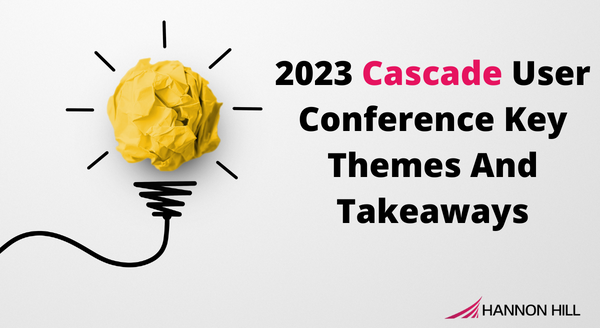
We hosted our 16th Cascade User Conference last week and could not be happier with how it went! More than 300 individuals representing over 100 organizations attended CUC23.
The participants ranged from veterans who have been using Cascade for over a decade to customers who recently joined our community. Several "Hall of Famers," including Erik Gorka of Reed College, Judy Steward of Western University, and Winston Churchill-Joel of Sarah Lawrence College, shared their knowledge and experiences in their presentations.
The three have combined hands-on experience with Cascade for over 45 years! Judy's candor in her presentation about lessons learned in the past 15 years was very well received.
This year's presentations ranged from technical "show and tell" to high-level strategic sessions.
Some of the most prominent themes were:
What do the themes have in common? The end goal is to increase the effectiveness of websites and drive target outcomes, such as student applications.
Making things easy for CMS users is crucial to fostering adoption and reducing content's go-to-market time. "The key is to find the right balance between rules and flexibility for end users," said Narmata Naguleswaran of Western University, in her session.
Since Cascade gives users complete control over the interface for each user group and role, it was no surprise that the presenters at CUC23 offered several approaches to balancing flexibility with brand consistency.
Much of this can be accomplished through components. Winston Churchill-Joell from Sarah Lawrence College, Lallo Vigil from the University of Texas at San Antonio, and Michael Nichols from Texas A&M University Libraries provided insights into their approaches to creating pre-built components to make it easy for non-technical users to build out their pages.
Churchill-Joell focused on accessibility when building accessible accordions. Gorka showed Reed College's approach to creating user-friendly component-based page templates that don't require any additional end-user training. Nichols showcased his concept of a Bootstrap-Based Page Builder with lots of options for content cards and shared fields, while Vigil demonstrated his use of Design Language Systems to create components in blocks.
Web personalization has undoubtedly arrived in higher education. Multiple presentations stressed the fact that prospective students expect content that is customized to their individual needs and interests.
Sandra Fancher of Stamats and Jose Rodriguez of the University of New Mexico College of Pharmacy presented a compelling case study and showed how the college was able to increase conversion rates by using Clive to show different videos and calls to action to visitors based on their persona and their stage in the decision-making process.
Showing the value of attending your institution is at the forefront of higher education marketing efforts, and program finders and pages play a major role in it.
Program finders can be found front and center on many homepages, just like the one for which Southern Utah University won a Cassie Award this year.
In addition, program finders should allow prospective students to filter their search on a number of different criteria, not just the name of the program but also based on what the student is passionate about and what type of impact they want to make in the world. Program finders and pages are not just informational but should also inspire.
This is a lesson that Michael Duncan and Caleb Hyatt of Geneva College shared with attendees in a session that covered strategy and technical knowledge and told the tale of the college revamping their finder and their program pages.
The team realized that the program pages needed an overhaul in order to be more effective. Not only did they redesign the pages, but they also hired a content specialist to help with crafting compelling messaging.
It’s not all about pulling in existing program information but also about authentic content, which is why faculty and staff had an opportunity to contribute.
Matt Herzberger, who has worked at four different universities, earned many virtual nods when he stated that program pages are “dollar for dollar, the most important pages on your site.”
"Treat it as such!" was the takeaway.
A few years ago, the sentiment was, “you can’t trick search engines, so why bother with SEO.”
Although search engines change their algorithms all the time, the intent is the same: reward sites and pages that provide relevant content that is clear, free of errors, and accessible.
Hannon Hill’s Charlie Holder hosted a session on all the different ways in which Cascade helps with SEO.
Matt Herzberger provided a slightly different angle when he showed a CMS-agnostic view of the technical aspects of SEO and content considerations.
The main lessons learned here were that as search engines evolve, so should your strategy because the quality content standards will only increase.
Bart Caylor of Caylor Solutions and Narmata Naguleswaran of Western University provided valuable insights into what it takes to plan and execute the launch of an effective higher education website.
While Caylor focused more on increasing enrollment, Naguleswaran concentrated primarily on the process. The audience agreed that whether you are revisiting your content, your information architecture, or your design, always keep your audience in mind.
After all, your site is for them, not you. Meet your audience where they are, speak their language, and answer the questions they need answered - a theme that could be detected in all sessions.
While all the sessions received terrific reviews from the attendees, a crowd favorite was Chris Halper’s (Webmaster of Concordia University Wisconsin) presentation on using Cascade CMS to publish to digital signage. We enjoyed a highly entertaining presentation, sometimes with sarcastic undertones, on how you can use the CMS to publish content everywhere, not just your site, including cafeteria menus.
Last Updated: Mar 2, 2023 11:00 AM